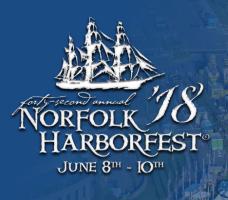 Norfolk’s forty-second annual Harborfest is now underway. It is described as the “largest, longest-running, free maritime festival in the nation.” This year there are seven traditional sailing vessels from Virginia and Maryland participating, including the Godspeed of Jamestown, Alliance of Yorktown, the Sultana of Chestertown, the Schooner Virginia of Norfolk, and Bonny Rover of Newport News.
Norfolk’s forty-second annual Harborfest is now underway. It is described as the “largest, longest-running, free maritime festival in the nation.” This year there are seven traditional sailing vessels from Virginia and Maryland participating, including the Godspeed of Jamestown, Alliance of Yorktown, the Sultana of Chestertown, the Schooner Virginia of Norfolk, and Bonny Rover of Newport News.
Some, however, particularly African Americans in Norfolk, have long boycotted the festival based on the decades-old rumors that the nautical festival tacitly celebrates the slave trade. Festival organizers dismiss the rumors as an “urban legend.” Harborfest started 42 years ago when the Norwegian tall ship Christian Radich docked three blocks from Town Point in Norfolk and has grown since then.
In some respects, however, the dismissal of the concerns regarding slavery seems like a lost opportunity. Chesapeake ports were second only to Charleston, Beaufort, and Savannah as ports of entry in the trans-Atlantic slave trade in the colonial United States. Between 1626 and 1830, 127,668 captured Africans arrived through Chesapeake ports, including Norfolk. In the early 1800s, Virginia was also a major transshipment point for slaves sold into the cotton trade in the Deep South.
Harborfest’s organizers say that the festival celebrates “our region’s rich nautical heritage.” The slave trade was a significant part of that nautical heritage. There is no good reason to ignore that history.
On Saturday, on the other side of the harbor, there will be an event honoring the African slaves who lost their lives lost during the Middle Passage. The Sankofa Projects hosts its annual International Day of Remembrance on Buckroe Beach in Hampton.
It is a shame that the two events cannot in some regard interact or coordinate their activities. Some of the first slaves in the English colonies in North America arrived in 1619 near Hampton, VA. Hampton History Museum registrar Beth Austin also notes that “the beginning of the end of slavery also occurred here in Hampton when three enslaved men sought the protection of the United States Army at the beginning of the Civil War and the commander at Fort Monroe declared them to be contraband of war … It provoked the political question that led to the Emancipation Proclamation.”
“I think we do a disservice to all of us when we don’t know the truth about this history,” Pittman Walke, founder of the Sankofa Projects, said. “This is not just African-American history, this is not African history, this is American history and it’s global history and we need to acknowledge it.”
As Faulkner wrote, “The past isn’t dead. It isn’t even past.”
